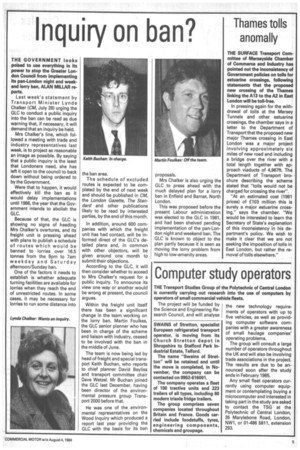Inquiry on ban?
Page 7

If you've noticed an error in this article please click here to report it so we can fix it.
THE GOVERNMENT looks poised to use everything in its power to stop the Greater London Council from implementing its pan-London night and weekend lorry ban, ALAN MILLAR reports.
Last week's statement by Transport Minister Lynda Chalker (CM, July 28) urging the GLC to conduct a public inquiry into the ban can be read as due warning that, if necessary, it will demand that an inquiry be held.
Mrs Chalker's line, which followed a meeting with trade and industry representatives last week, is to project as reasonable an image as possible. By saying that a public inquiry is the least that Londoners need, she has left it open to the council to back down without being ordered to by the Government.
Were that to happen, it would effectively kill the ban as it would delay implementations until 1986, the year that the Government intends to abolish the GLC.
Because of that, the GLC is showing no signs of heeding Mrs Chalker's overtures, and its freight unit is pressing ahead with plans to publish a schedule of routes which would be banned to lorries over 16.5 tonnes from the 9pm to 7am weekday and Saturday afternoon/Sunday ban.
One of the factors it needs to establish is whether adequate turning facilities are available for lorries when they reach the end of unrestricted routes. In some cases, it may be necessary for lorries to run some distance into the ban area.
The schedule of excluded routes is expected to be completed by the end of next week and should be published in CM, the London Gazette, The Standard and other publications likely to be read by interested parties, by the end of this month.
In addition, around 600 companies with which the freight unit has had contact, will be informed direct of the GLC's detailed plans and, in common with other objectors, will be given around one month to submit their objections.
According to the GLC, it will then consider whether to acceed to Mrs Chalker's request for a public inquiry. To announce its view one way or another would be wrong at present, the council argues.
Within the freight unit itself there has been a significant change in the team working on the lorry ban. Martin Foulkes, the GLC senior planner who has been in charge of the scheme and liaison with industry, ceased to be involved with the ban in the middle of June.
The team is now being led by head of freight and special transport Keith Buchan, who reports to chief planner David Bayliss and transport committee chair Dave Wetzel. Mr Buchan joined the GLC last December, having been director of the environmental pressure group Transport 2000 before that.
He was one of the environmental representatives on the Wood Inquiry which produced a report last year providing the GLC with the basis for its ban proposals.
Mrs Chalker is also urging the GLC to press ahead with the much delayed plan for a lorry ban in Enfield and Barnet, North London.
This was proposed before the present Labour administration was elected to the GLC in 1981, and had been shelved pending implementation of the pan-London night and weekend ban. The GLC is known to object to the plan partly because it is seen as moving the lorry problem from high to low-amenity areas.
























































































